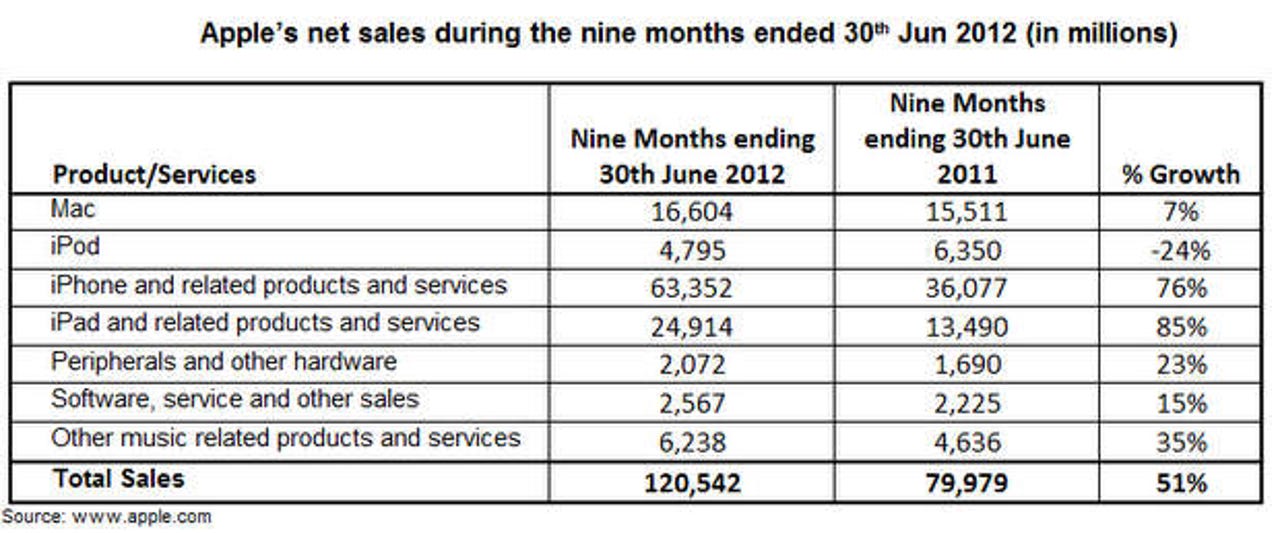Apple showing vulnerability year after Jobs' death

One year after the death of Apple co-founder Steve Jobs, the firm's sales are still going strong. However, observers noted that its launch events have been duller since and it needs to work on "dramatic improvements" in its future products to keep it brand loyalty.
Jobs passed away on October 5, 2011 from pancreatic cancer. Just prior to his death, he had resigned from his role as CEO in August 2011, passing on his responsibility to current Apple CEO Tim Cook.
Naveen Mishra, industry principal for ICT practice in Asia-Pacific at Frost & Sullivan, said the sale of most of Apple products, except iPods, have been "quite strong" over the last three quarters since Jobs' death. The decline in iPod sales started in last few years due to the popularity of iPhones and iPads, he explained, adding that desktop has seen a little softening in sales.

Many factors affecting market share
Shalini Verma, principal analyst at Gartner, noted that Apple's sales have not been affected by Jobs' death.
However, its market share in smartphones has been affected by factors such as the launch dates of its iPhone and "strong" competition from Samsung.
Verma explained Apple's global market share for smartphones rose from 15 percent in the third quarter of 2011 to 23 percent in the fourth quarter of 2011, because of the launch of iPhone 4S in October 2011. Similarly, Apple's market share fell in Q2 2012 because consumers were waiting for iPhone 5, she added.
"Steve Jobs' death has not been a big factor in the company’s sales so far because he was involved in the development of both the iPhone 4S and the iPhone 5," said Verma.
Mishra noted that while Apple has not announced its fourth-quarter results for 2012, the analyst firm expects the technology giant to cross another milestone of US$150 billion in annual revenue, after pulling in US$35 billion in the last quarter.
"Such strong performance comes from Apple's ability to bring innovative devices and tightly integrated ecosystem of applications and services," he added.
Apple's stock price has risen more than 70 percent from last year, hitting a new high when it breached the US$700 a share mark last month, further cementing its place as the most valuable company on the planet.
Apple launches dull without Jobs
While Apple's products are still selling well, Verma said the absence of Jobs meant that Apple's launch events were no longer "spectacular." This tends to impact the perception of the company among "technology enthusiasts" who will influence consumers' buying behavior over time, she said.
Singapore-based iOS app developer Kevin Chan agreed. "Apple has lost [Steve Jobs's] showmanship. The dude was a great storyteller, and his reality distortion field and 'one more thing' made his product launches really special. [Tim Cook's] launches don't even come close," he added.
Mishra added that while each new Apple product was better than its predecessors, the "wow" factor seems to be missing in the last few product launches.
Apple must continue cultivating brand loyalty
Apple will need to offer "dramatic improvements" in its products to keep brand loyalty, especially in an industry "characterized by aggressive pricing practices, frequent product introductions, evolving design approaches and technologies, rapid adoption of technological and product advancements and price sensitivity", the Frost & Sullivan industry principal said.
"Apple has come to be associated with excellence in design and simplicity in user experience because of this consistency over time. This is a potent combination that has made Apple the most valuable technology company today," Verma explained.
When market momentum is with a company, it can ride the momentum despite minimal innovation. This is the power of perception," she said.
However, no company is invincible, Verma pointed out, adding unless Apple maintained the same level of consistency in the years to come, brand loyalty will go elsewhere.
'Vulnerable' without Jobs
Content producer Jeanne Wong said Apple seems to be "very vulnerable" without Jobs. "It's like all the other companies become bolder to attack Apple," she said, pointing to the Apple-Samsung legal war which was "brewing before but is now a full-on battle".
Wong added that the quality of Apple products seem to have dropped since iPhone 4S and "iPhone 5 just sounded terrible".
"Previously with Jobs, you won't hear such bad malfunctions going on like Maps. Jobs always had really strict quality control and now that seems to be missing," she said.
"People are still buying because the fever is still on but with competitors stepping up, Apple is going to need to buck up. How can they launch products when there are so many kinks to iron out?" Wong added.
Singapore-based designer Max Yam believes with Jobs' passing, the beauty of combining art and technology has been lost. He added that the power of using tech product design to move people is diminishing.
Yam said: "Apple is rejoining the league of technology giants and the IT industry has lost perhaps its only human touch."
"I'm not a hardcore fan of Apple so I hope to see the return of the human touch and the artistic feel of products in the technology world, be it Nokia, Microsoft, Google, or even Dell," he said.